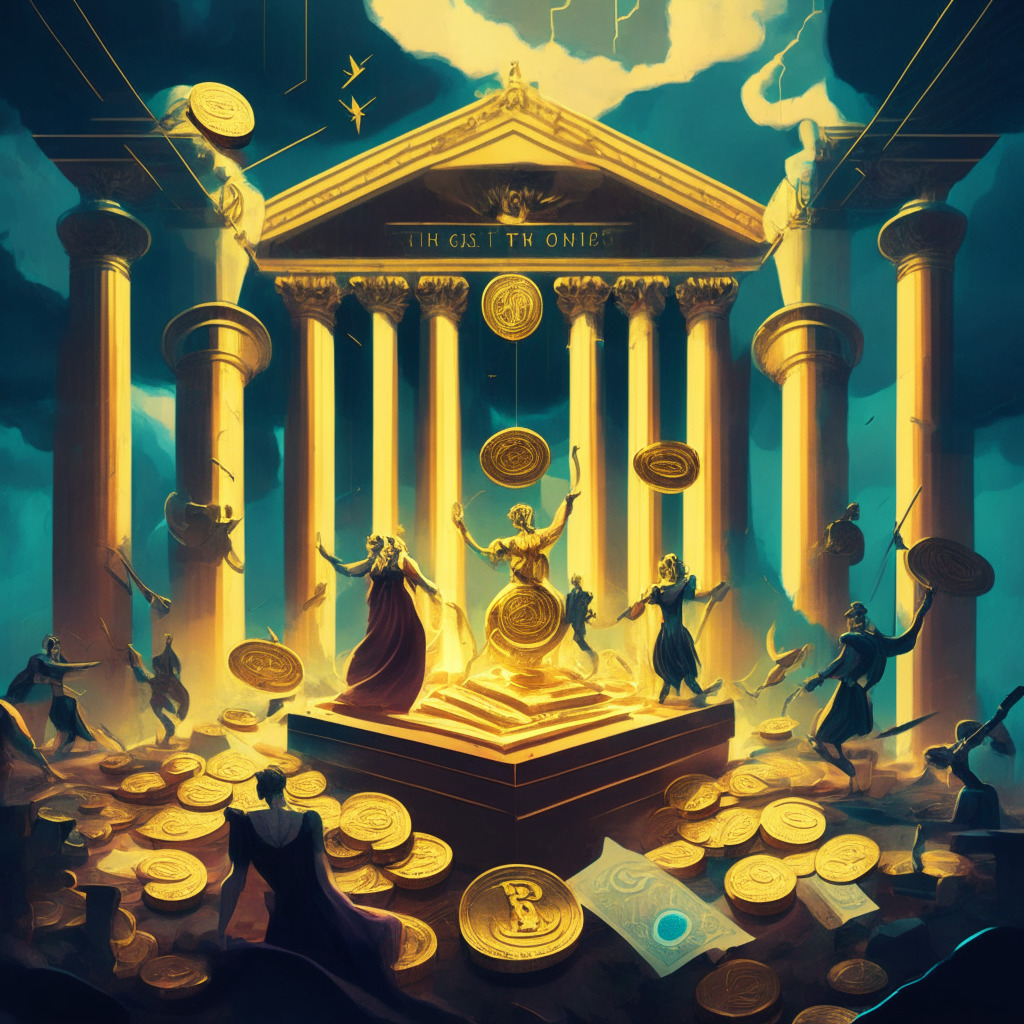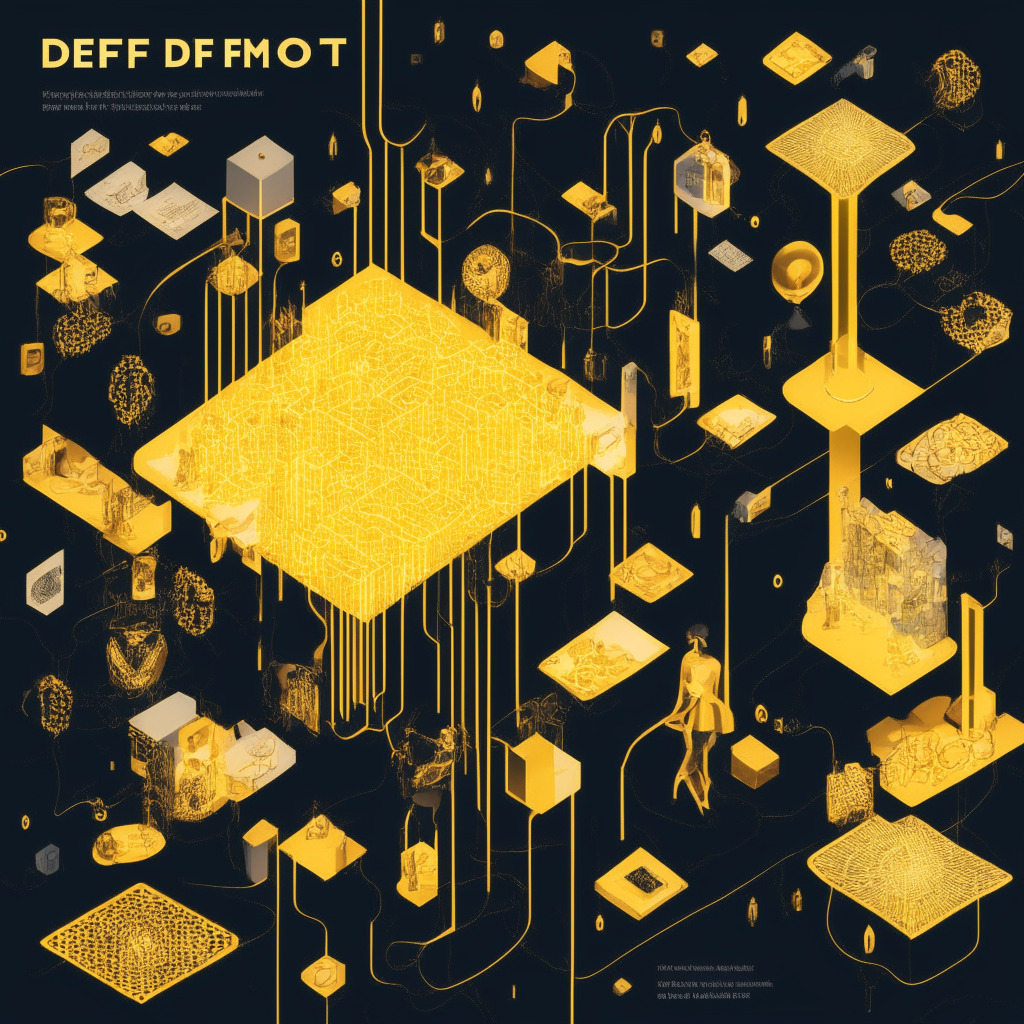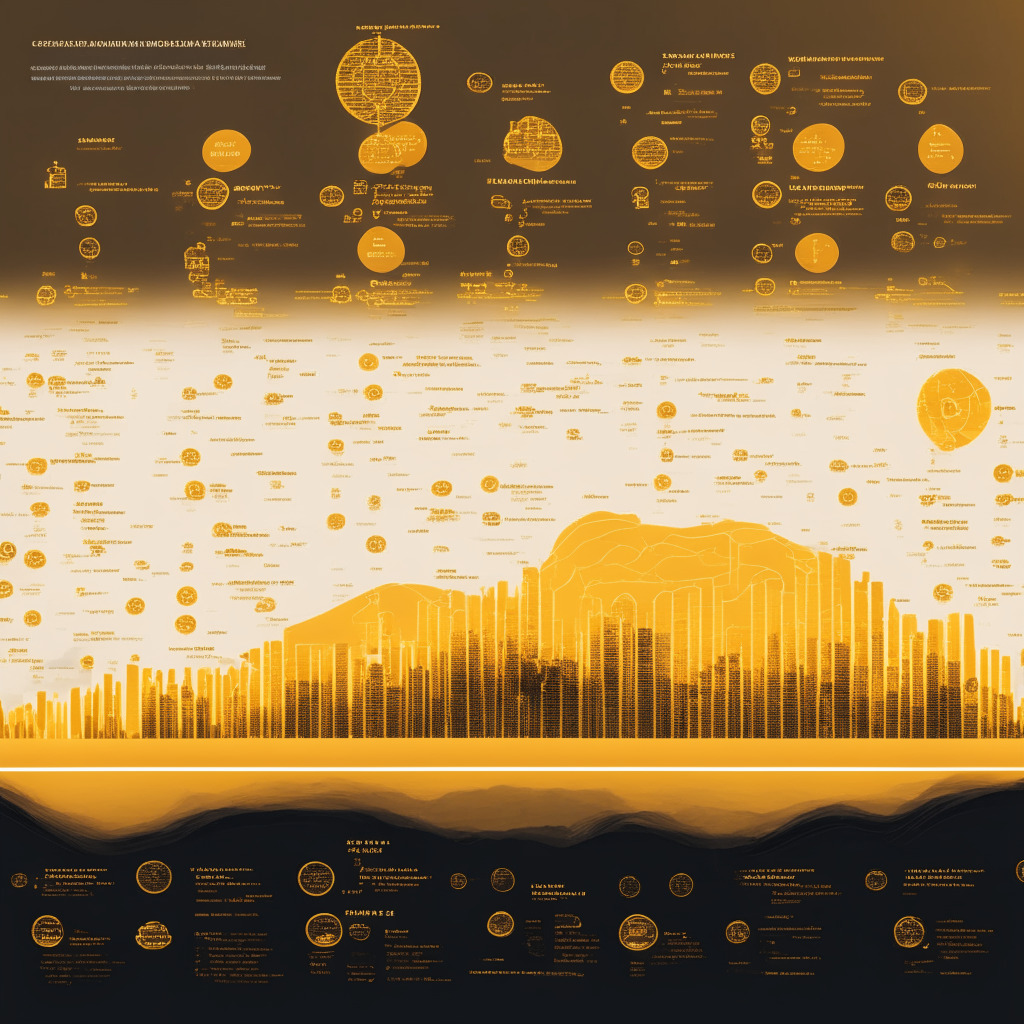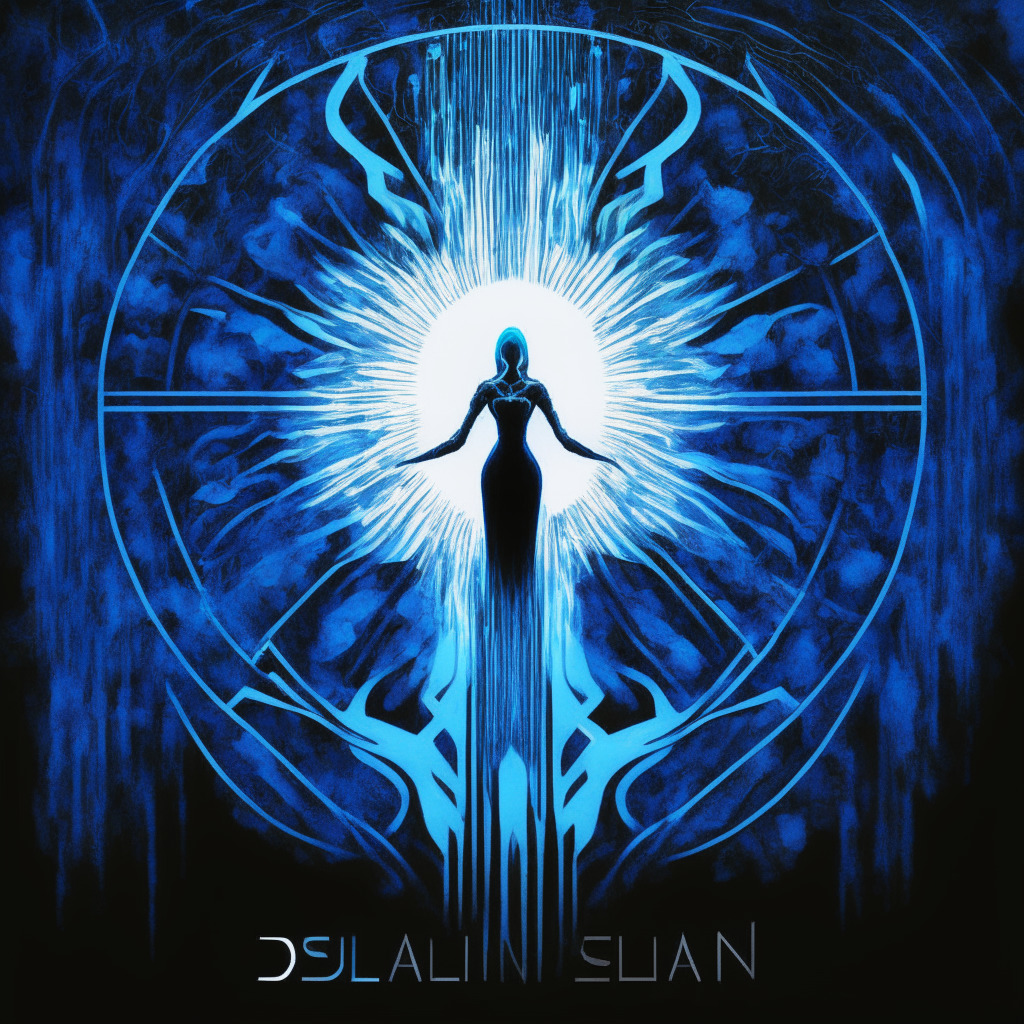A wave of 33 trillion PEPE tokens, valued at approximately $46.37 million, has hit various crypto exchanges, potentially signaling an imminent large-scale sell-off and a dramatic drop in the token’s value. Amid the uncertainty surrounding the popular memecoin, both bullish and bearish outcomes seem feasible; thorough market research is essential before investing.
Search Results for: Scope Protocol
Balancing Act: Supervising AI Vs. Regulating Cryptocurrencies – Who Gets the Upper Hand?
This article discusses a project launched by UNESCO and the Dutch government to study AI supervision across Europe, aiming to develop guidelines from best practices. It also highlights the contrast of some nations focusing heavily on AI regulations, while cryptocurrency protocols, such as for stablecoin transactions, are being neglected. The importance is stressed of striking a balance between embracing technological advances and ensuring proper regulation for consumer protection.
Navigating the Dichotomy of Blockchain’s Future: Innovation vs Regulation
“Yield Protocol’s decision to cease operations, impacted by decreased demand and strict regulations, juxtaposes with Wirex’s launch of W-Pay, a bridge for decentralized applications and traditional payment infrastructures. The future of blockchain remains uncertain amid these contrasting developments.”
Chase UK Targets Crypto Transactions: Banking Hurdles & Community Reaction
Starting October 16, Chase, a digital bank owned by JPMorgan, will decline transactions related to crypto assets, citing rising instances of fraud. This decision aligns with several other UK banks that have recently narrowed the scope of operations with cryptocurrencies.
Exploring The New Frontier: Bitcoin Metaverse Ecosystem and Gaming Tokens
Animoca Brands plans to develop a metaverse ecosystem token on the Bitcoin network, centered around Bitcoin Ordinals. The game, Life Beyond, by Darewise Entertainment aims to pilot the Bitcoin-based metaverse token for in-game assets and virtual land transactions with Horizen Labs’ assistance. The initiative explores Bitcoin’s utility in the evolving digital gaming environment, despite scalability concerns.
Navigating the Storm: DeFi Regulations, Penalties, and the Future of Crypto Innovation
Recently, the CFTC launched enforcement proceedings against several DeFi protocols, imposing substantial penalties for alleged regulatory infractions. This unfolding regulatory drama draws attention to the clash between innovative crypto industry and traditional financial regulations. It raises crucial questions about compliance, investor protection, and the potential impact on America’s technological advancement position.
Coinbase and Binance Embrace Bitcoin Lightning Network: A Boon or a Bane?
Coinbase, a major cryptocurrency exchange, has confirmed plans to incorporate the Bitcoin Lightning Network (LN), aiming to solve Bitcoin’s scalability problems. This decision, which surprised some industry bigwigs, signifies a commitment to enhancing transaction speed and reducing fees for Bitcoin, the largest cryptocurrency. Moreover, concerns were raised about misleading metrics often used to gauge a cryptocurrency’s health.
Navigating the Regulatory Conundrum: A Balanced Approach for DeFi Advancement
Commissioner Summer K. Mersinger raises concerns over CFTC’s focus on enforcement actions rather than engaging with the public and stakeholders when dealing with DeFi technologies. She suggests collaborative rulemaking, regulatory instruments and public engagement can be more effective in managing DeFi’s innovative scope and ensuring market participant safety.
Unveiling the Veils of DeFi: The Road to Normalization Amidst Risks and Rewards
“Cross-chain bridge Synapse experiences a value sink due to a SYN tokens dump by an anonymous liquidity provider. This highlights potential insecurities in the DeFi space, underscoring the necessity for protective measures and consistent market analysis.”
Genesis Bankruptcy Fallout: A Battle of Crypto Titans Over Fairness and $3.4 Billion Liabilities
Genesis, a crypto lender facing bankruptcy, is being accused by creditors, including Gemini and Digital Currency Group, of manipulating bankruptcy proceedings with their proposed settlement. The settlement, seen by some as giving preferential treatment to certain creditors, includes Alameda Research receiving $175 million from Genesis’s assets. Critics argue it deviates from acceptable Chapter 11 protocol.
Uniswap Lawsuit Dismissal: Revealing DeFi Regulation Challenges & Solutions
A recent court dismissal of a class action lawsuit against Uniswap has prompted further discussions on cryptocurrency regulation. The ruling highlights the complex nature of DeFi platforms, emphasizing that software creators cannot be held liable for third-party misuse. The judgment underscores the importance of regulating entities in the tech-driven financial world, without stifling innovation through over-regulation.
The Evolution of Total Value Locked (TVL) in DeFi: The Impact of Tokenized Real-World Assets
As decentralized finance or DeFi matures, the concept of total value locked (TVL), which represents the amount of money in a specific protocol, now includes tokenized real-world assets (RWAs), broadening understanding of on-chain assets. RWAs, including private equity, mortgages, and illiquid funds, are now incorporated within this framework, making DeFi more appealing to large-scale investors. However, limited availability of segmented and classified RWA TVL data remains a challenge.
A Court Win for Crypto ETFs: Triumph or Prelude to Turbulence?
“A federal appeals court, led by Circuit Judge Neomi Rao, mandated the U.S. Securities and Exchange Commission (SEC) review its decision to deny Grayscale Investments the right to convert its Grayscale Bitcoin Trust (GBTC) into an Exchange-Traded Fund (ETF). The victory raises questions over the public’s right to invest in cryptocurrency, and pushes against the SEC’s persistent resistance to Bitcoin ETFs. The cryptocurrency world continues to evolve rapidly, with a need for balance between access rights, safety, market volatility, and financial risks.”
Balancer’s Vulnerability Exploit: A $900k Loss and Lessons to Learn in DeFi Space
The decentralized finance protocol Balancer experienced a significant exploit, leading to a loss of nearly $900,000. This unexpected event comes after recent concerns about a critical vulnerability affecting numerous V2 pools. Remote asset networks like Ethereum, Polygon, Arbitrum among others were reportedly exposed to this vulnerability, reminding of the constant security challenges DeFi platforms face.
Navigating the Tides: US Treasury’s Proposed Crypto Regulations Stir Debate
The US Treasury and IRS propose new regulations making digital asset brokers accountable for reporting certain sales and exchanges. This move aims to simplify tax calculations, bring digital asset tax reporting on par with securities, and prevent tax evasion. Critics, however, see this as an attempt at excessive government control, potentially stifling the growth of decentralization and web3 adoption.
Navigating the Tokenization Wave: Growing Value and Unique Challenges in Blockchain-based Assets
Tokenization uses blockchain to monetize tangible and intangible assets, making them tradable and transparent. Despite cryptos’ ridicule for lack of tangible value, blockchain’s potential to transform assets is increasing. There’s even exploration of derivative, swap, and fixed income security systems. Companies like Pendle Finance and Dinari are demonstrating this potential, while concerns rise about tokenizing user engagement. Elsewhere, Central African Republic is aiming to tokenize its fiat money, a move that could inspire other countries.
Balancing Innovation and Regulation: A Probe into Worldcoin’s Data Practices in Argentina
“The Argentine Agency for Access to Public Information (AAIP) is scrutinizing Worldcoin’s data harvesting practices in Argentina, questioning the balance between innovation provided by blockchain technology and regulatory concerns. This probe into Worldcoin’s security protocols and data processing methods raises skepticism around blockchain entities’ practices and their wider implications.”
Forta Network Amplifies Scam Detection: A Leap Forward or a Perpetual Tightrope Walk?
“Forta Network has enhanced its scam detection services by expanding its threat focus and incorporating malicious URL data. The service employs real-time threat detection across seven Ethereum Virtual Machine chains, and uses predictive techniques and new smart contract scanners to identify potential crypto threats.”
Decentralized Asset Management: The Balancing Act of Security and Innovation
“Blockchain technology is leading innovative disruption with robust, user-centric platforms. A notable example is Valio, a Decentralized Asset Management System now available on Arbitrum and Optimism networks. It provides a service where professional traders manage users’ funds, promising unprecedented transparency and reduced risk.”
Revival or Despair? Solana’s Fate Hinges on New Token Introductions
“Revival of Solana relies on new tokens introduction within the Solana blockchain, promoting trading activity, liquidity, and user influx in a needy decentralized finance ecosystem. However, will this influx really result in lasting growth, or is it merely circulation of existing capital?”
Unpredictable Dance: Blockchain’s Global Developments and Regulatory Twists
These developments underscore an exciting time for blockchain technologies, highlighting the intricate dance between regulators and innovators. They illustrate the challenges that emerge in a rapidly evolving digital ecosystem. However, the future scope for blockchain seems expansive and unpredictable.
Bitcoin Enters the Gaming Zone: Exciting Innovation or Risky Move?
“New Bitcoin City, a recently launched platform, uses Bitcoin to create games, conduct NFT auctions and operate a marketplace. Further expanding Bitcoin’s utility, developers have leveraged BRC-20 standards to issue tokens and create DeFi applications, extending Bitcoin’s impact beyond just a digital currency.”
Bitcoin Lightning Network: Coinbase’s Game Changer or Risky Adventure?
Coinbase, a leading cryptocurrency trading platform, plans to incorporate Bitcoin’s Lightning Network to its services. This innovative second layer for Bitcoin transactions leverages micropayment channels to accelerate transaction speeds and reduce costs, potentially transforming Bitcoin as a payment method. However, security concerns and technical challenges lie ahead.
Unraveling the Dynamics of Optimism’s Upcoming Token Release: Impact and Resiliency in Flux
Layer-2 blockchain, Optimism, is set to release $36 million worth of tokens, a move that previously triggered a temporary price decrease in its OP token. Despite initial fluctuations, year-to-date performance established a strong 67% growth, with operational decisions offering dynamic investment evaluations.
Navigating Blockchain Security: Unpacking the Conic Finance Exploit and the Path Forward
The decentralized finance platform, Conic Finance, was recently exploited for $3.26 million in ETH via a single transaction. This incident highlights ongoing concerns about blockchain security and emphasizes the need for more sophisticated protection measures even as blockchain contracts continue to innovate and evolve.
Challenging the CANSEE Act: Decentralized Finance in Regulatory Crosshairs
The recently introduced US Senate bill, Crypto-Asset National Security Enhancement Act (CANSEE), targets the DeFi sector with the aim of curbing money laundering. However, its ambiguous definition of ‘control’ over DeFi protocol and potential infringement on software developers’ rights have led to widespread disapproval.
Unleashing the Potential of Tokenization: A Revolutionary Shift in Global Finance
“Tokenization transforms tangible or intangible real-world assets into virtual investment vehicles on the blockchain. Stocks may be traded round-the-clock, much like cryptocurrency. While tokenization sounds transparent and risk-free, it has potential pitfalls. However, traditional financial institutions can’t ignore the potential benefits of blockchain any longer.”
Futureverse Secures $54M in Funding: Reshaping Metaverse with Partnerships and AI Innovation
“With an impressive $54 million funding round led by 10T Holdings and Ripple, Futureverse aims to revolutionize the metaverse landscape through advanced AI content generation tools. The company’s partnership with Ripple for redefining metaverse applications adds to their ambition.”
Eyeball Scanning for Cryptocurrency: An Insight into Worldcoin’s Innovative Yet Controversial Venture
Worldcoin’s project World ID, a “global digital passport,” is gaining popularity, with 2 million sign-ups achieved in record time. This system rewards users with cryptocurrency for uploading their iris data. Despite potential privacy concerns, other protocols like Okta’s Auth0 and Talent Protocol have integrated World ID into their processes, endorsing the project’s credibility.
Unraveling the Intricacies of Polygon’s Token Strategy: Maturing from MATIC to POL
Polygon, an Ethereum scaling solution, plans to change its native token from MATIC to POL. Touted as a “3rd generation token”, POL optimizes user experience across the protocol’s layer 2 ecosystem and enables holders to earn rewards as validators across multiple chains. This change prompts validators to embrace multi-chain roles, yielding varying rewards and potentially significant benefits.
Unpacking Polygon’s Proposal: From MATIC to POL, a Multipurpose Token Revolution
Polygon has proposed an upgrade to transform its MATIC token into a multipurpose one, now called POL. If approved, POL will be capable of serving multiple chains across all Polygon protocols without security compromise. This will introduce features like limitless scalability and seamless transitions, paving the way for broader blockchain use-cases and potential mass crypto adoption.
Exploring Coinbase’s New Encrypted Messaging: Pioneering Innovation or a Step too Far?
“Coinbase has revealed a new feature allowing encrypted messaging between its crypto wallet users. This innovative feature is supported by the Ethereum addresses and the XMTP communications protocol. While it offers an effortless communication experience and transactional transparency, its potential is limited by not recording exchanges on a blockchain.”































